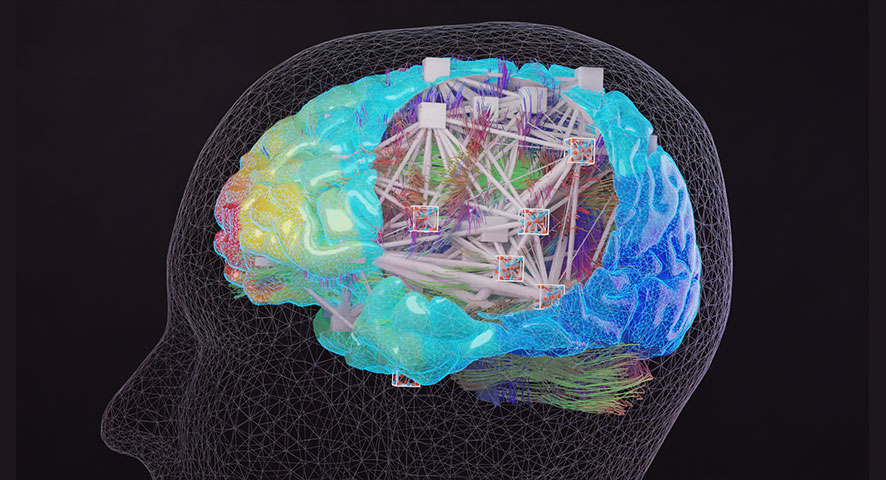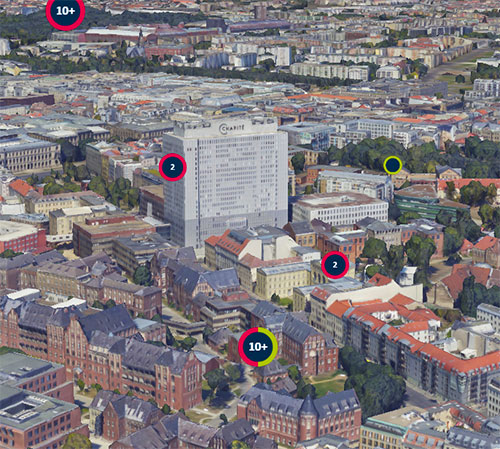Research environment
The outstanding scientific landscape is a key factor in the success of many of the companies that have come to the region or were founded here. A wide range of life science research is conducted in the capital region in intense interdisciplinary networks. Exchanges and cooperation take place over short distances – not only between different research institutes, but also in many ways between industry, clinics and academic research.
This benefits the successful technology transfer and the quick, successful implementation of research results into competitive products. Thanks to the networking of everyone along the entire value chain, Berlin-Brandenburg is an ideal development location for medical technology with wide application.
In addition to Charité - Universitätsmedizin Berlin and the Medical University of Lausitz - Carl Thiem, the German capital region is home to over 40 renowned scientific institutions, including the Berlin Institute of Health (BIH), the German Heart Center Berlin, Physikalisch Technische Bundesanstalt (PTB), and other well-known Fraunhofer, Helmholtz, Leibniz, and Max Planck Institutes in Berlin and Brandenburg.
Science and research institutions
Major research facilities
- BIH Center for Regenerative Therapies (BCRT)
- Federal Institute for Materials Research and Testing (BAM)
- Der Simulierte Mensch (Si-M)
- German Research Center for Artificial Intelligence (DFKI)
- German Heart Center Berlin - Deutsches Herzzentrum der Charité (DHZC)
- German Arthritis Research Center (DRFZ)
- Hasso Plattner Institut (HPI)
- Julius Wolff Institute (JWI) - Center for Musculoskeletal Biomechanics and Regeneration
- Rahel Hirsch Center for Translational Medicine at Berlin Institute of Health at Charité (BIH)
- Robert Koch Institute (RKI)
- Zuse Institute Berlin (ZIB)
Max Planck Institute (MPI)
Institutes of the Fraunhofer Society
- Fraunhofer Institute for Applied Polymer Research IAP
- Fraunhofer Institute for Experimental Software Engineering IESE
- Fraunhofer Institute for Digital Medicine MEVIS (branch office)
- Fraunhofer Institute for Production Systems and Design Technology IPK
- Fraunhofer Institute Heinrich Hertz Institute HHI
- Fraunhofer Institute for Open Communication Systems FOKUS
- Fraunhofer Institute for Cell Therapy and Immunology, Branch Bioanalytics and Bioprocesses IZI-BB
- Fraunhofer Institute for Reliability and Microintegration IZM
Institutes of Leibniz Society (Blue List)
- Ferdinand Braun Institute for High Frequency Technology FBH
- Leibniz-Institute for Molecular Pharmacology FMP
- Institute for Crystal Growth IKZ
- Max Born Institute for Nonlinear Optics and Short Pulse Spectroscopy MBI
- Paul Drude Institute for Solid State Electronics PDI
- Weierstraß Institute for Applied Analysis and Stochastics WIAS
Institutes of the Helmholtz Association
The broad range of research offered by the Berlin science and research institutions includes, in addition to the classic core areas of medical technology such as the Department of Medical Technology (Institute for Machine Design and Systems Engineering) at the TU Berlin, a wide range of cross-sectional technologies. These include microsystems and nanotechnology, optical technologies, information technology, new materials, biomechanics, mathematics, chemistry and physics.
With a highly diverse population of potential test subjects, the German capital region, with both the country's largest city and extensive rural areas, offers ideal conditions for the research, development, and testing of innovative and networked health solutions.


